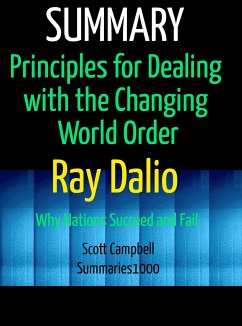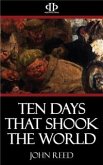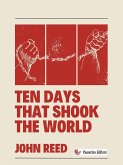NEW YORK TIMES BESTSELLER
The Ray Dalio explanation of Principles of Dealing with Changing World Order serves as the introduction to this comprehensive overview. What follows is a thorough study of his chapters on China.
The purpose of this book and the CD is to supplement and serve as study aids, not to take the place of the priceless Ray Dalio work.
"A challenging read...
Few books cover such vast economic histories as well as Mr. Dalio's. More remarkably, Mr. Dalio has discovered historical measurements that may be used to comprehend the present." --The New York Times by Andrew Ross Sorkin
Principles for Dealing with the Changing World Order, by renowned investor Ray Dalio, author of the #1 New York Times bestseller Principles, who has spent half a century studying global economies and markets, look at history's most turbulent economic and political periods to explain why the times ahead will likely be radically different from those we have experienced in our lifetimes—and to provide useful advice on how to navigate them successfully.
A few years ago, Ray Dalio saw a confluence of political and economic circumstances that he had never seen before. Due to the largest wealth, political, and value disparities in more than a century and the rise of global power to challenge the preexisting world order, the world's three major reserve currencies saw massive money printing and major political and social conflicts. This was especially true of the United States. The last instance of this convergence occurred between 1930 and 1945. This revelation motivated Dalio to search for the repeating trends and cause-and-effect relationships that underlie all important changes in wealth and power during the preceding 500 years.
In this outstanding and timely addition to his Principles series, Dalio takes readers on a tour of the world's major empires, including the Dutch, British, and American empires, putting the "Big Cycle" that has shaped the successes and failures of all the world's major nations throughout history into perspective. He reveals the enduring and universal forces that will shape the future. Under legalism, people are more inclined to do evil than good since they are primarily motivated by self-interest and need strict rules to control their inclinations.
The Ray Dalio explanation of Principles of Dealing with Changing World Order serves as the introduction to this comprehensive overview. What follows is a thorough study of his chapters on China.
The purpose of this book and the CD is to supplement and serve as study aids, not to take the place of the priceless Ray Dalio work.
"A challenging read...
Few books cover such vast economic histories as well as Mr. Dalio's. More remarkably, Mr. Dalio has discovered historical measurements that may be used to comprehend the present." --The New York Times by Andrew Ross Sorkin
Principles for Dealing with the Changing World Order, by renowned investor Ray Dalio, author of the #1 New York Times bestseller Principles, who has spent half a century studying global economies and markets, look at history's most turbulent economic and political periods to explain why the times ahead will likely be radically different from those we have experienced in our lifetimes—and to provide useful advice on how to navigate them successfully.
A few years ago, Ray Dalio saw a confluence of political and economic circumstances that he had never seen before. Due to the largest wealth, political, and value disparities in more than a century and the rise of global power to challenge the preexisting world order, the world's three major reserve currencies saw massive money printing and major political and social conflicts. This was especially true of the United States. The last instance of this convergence occurred between 1930 and 1945. This revelation motivated Dalio to search for the repeating trends and cause-and-effect relationships that underlie all important changes in wealth and power during the preceding 500 years.
In this outstanding and timely addition to his Principles series, Dalio takes readers on a tour of the world's major empires, including the Dutch, British, and American empires, putting the "Big Cycle" that has shaped the successes and failures of all the world's major nations throughout history into perspective. He reveals the enduring and universal forces that will shape the future. Under legalism, people are more inclined to do evil than good since they are primarily motivated by self-interest and need strict rules to control their inclinations.








